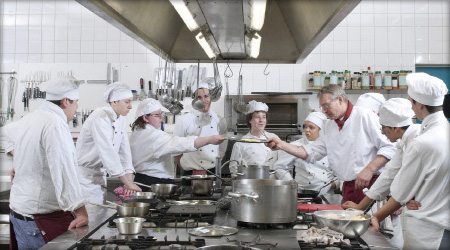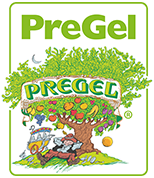
The value of formal education continues to be a widely debated topic among culinary professionals. Some of the industry’s most revered chefs have risen through the ranks of a family-owned bakery or restaurant, while others studied at some of the best culinary institutions around the world. So what is it that makes chefs and culinary professionals experts in the dessert world?

There are many choices out there for those looking to learn the art of baking and pastry. Interest in the culinary trade has skyrocketed over the past decade, thanks in part to The Food Network and other specialty television programming bringing celebrity chefs and their magnificent creations into our homes. As a result, many individuals are looking for the best way to jump start their culinary career, while others already in the industry are working to refine their training and expertise to gain a competitive edge as more and more people are entering the workforce.
Attendance at culinary schools has soared, and new schools are cropping up every day. In choosing an educational program, there are many things to consider. While some may pick a traditional college or institute, others may find small, special-interest classes to be better suited for their career goals. In the case of formal programs, it is important that the school be properly accredited by the Accrediting Council for Independent Colleges and Schools (ACCSC). Length of programs, internships and career placement assistance are crucial offerings any student should consider when making their choice. Location is another important factor that influences the style of cooking taught. Educational tracks and programs vary across different countries, let’s take a closer look at the types of programs and educational courses typically found in the U.S.:
Diploma – This course of study is typically completed in six months for daytime classes and nine months for nighttime. A school may divide its focus between hands-on training and theory, requiring a certain number of hours in each. A diploma program appeals to students who wish to begin their new career quickly and want to immerse themselves in training. Tuition varies, with the daytime sessions being a little higher in price. Schools will usually look for a recent high school or college transcript. Previous culinary experience is not required.
Certificate – A shorter, more focused program usually lasting between six and 12 weeks. Students have the option of attending classes according to their schedule, whether it is evenings, nights or weekends. Each session targets a specific topic, such as breads, classic pastries or cake decorating. This is typically the least expensive option, making it ideal for young students as well as career-changers looking to get an initial feel for the industry. Some schools will include tools and supplies in their fee while others charge separately. Transcripts are not always required, and entry-level programs do not have prerequisites.
Degree – These programs are the most formalized type of culinary training, generally offered as a two-year Associate of Applied Science degree, or often as a part of a four-year Bachelor’s degree in Art or Hospitality Management. Students should expect to take a full course load of hands-on and academic classes, though some schools may be able to condense the two-year timeframe for those who already have other degrees. While tuition costs are usually highest for degree programs, the long-term payback of having a degree from a reputable school is the ideal payoff. Due to the time and financial commitments, degree programs are best for those who feel confident that the culinary industry is their future career path. Culinary colleges and universities are committed to the success of their students. “Our Associate and Bachelor degree programs encompass a multidisciplinary curriculum – committed to developing skills essential for our graduates to become great chefs and world-class leaders,” says Wanda Cropper, MA, CCE, CWPC, University Director & Assistant Dean of International Baking & Pastry Institute at the Charlotte campus of Johnson & Wales University.
Continuing Education – Various suppliers and food companies in the industry offer specialty classes that focus on specific techniques and ingredients, etc. Many of these classes have been approved by the American Culinary Federation (ACF) as Continuing Education Hours (CEHs) for those looking to build their ACF credentials and seek new certifications. For example, the 5-Star Pastry Series classes offered by PreGel AMERICA allow students to attend various courses on special interest topics – from classic French buffet to advanced chocolate and sugar showpiece construction. For those looking to perfect their chocolate skills, Barry Callebaut offers a wide range of pastry, baking and confectionery classes at their Chocolate Academy in Chicago (and about a dozen other locations worldwide). Jerome Landrieu, Technical Advisor/Head of Chocolate Academy, explains the value of these focused, special interest classes: “By bringing new techniques, innovative styles and fail-proof methods to the pastry and chocolate industry, we provide individuals with skills they need to pursue or further their careers in the food industry … We teach students not just recipes, but demonstrate invaluable information and continue to support them throughout their careers. That is the purpose of the Academy, to teach and support.”
Other Alternatives – For those who have exhausted the culinary educational circuit or for those who learn best through self-experience, there are other ways to work towards becoming an expert in the baking and pastry trade. Competitions are increasingly popular and frequent, allowing individuals to push themselves and achieve their goals in new and challenging ways. Whether you’re training for a small, local competition or your goal is to compete at Le Coupe de Monde de la Patisserie (the world’s most renowned pastry competition, with over 20 countries present in France each year), there is much opportunity for personal and team advancement. According to Frederic Monti, Corporate Pastry Chef for PreGel AMERICA and seasoned pastry competitor, competitions provide an opportunity for exposure in the industry and help build your reputation. Moreover, “Competitions increase your level of discipline and help you to refine your work. You learn the best ways to practice and organize your time – always working cleanly and more efficiently, since your success depends on this,” says Monti. Additionally, competitions help build chefs’ confidence in their work, while the judging component ideally allows chefs to see areas for improvement and fine-tuning.
As with nearly every industry, striving towards excellence and always pushing to become an expert is important; however, the learning experiences never end. An “expert” may attend a school with the best reputation and work with the most well-known chefs, while another “expert” may have an unwavering discipline and drive to educate his- or herself, perfecting their skills slowly and steadily throughout the years. Overall, a constant commitment to the craft and a plethora of educational experience all contribute to the evolution of individuals in their careers, helping them become “experts.” The options for education and advancement through competitive work appear broader by the day, and this means that we will continue to see new faces and, fresh and innovative work in the culinary industry.
